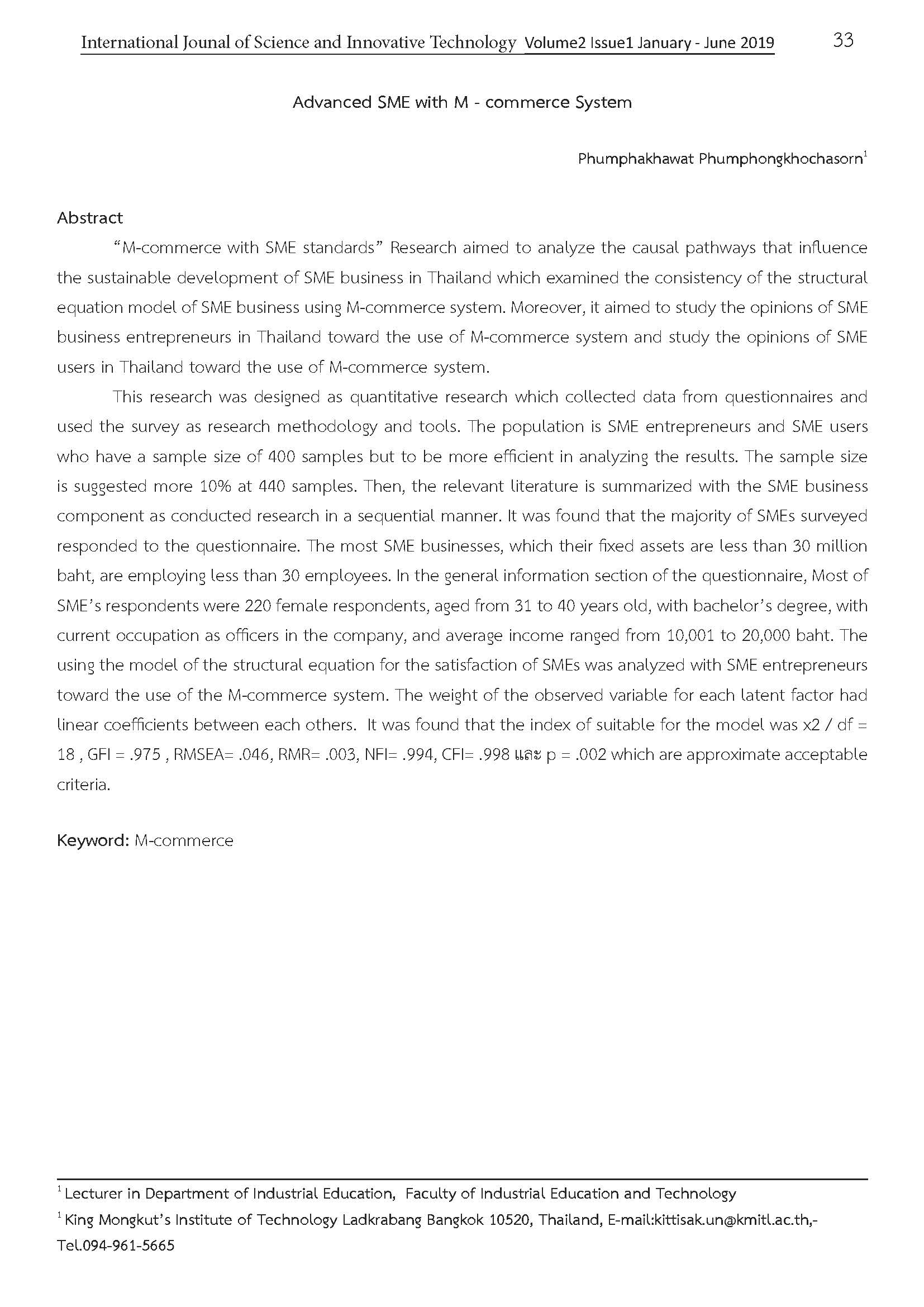Advanced SME with M - commerce System Advanced SME with M - commerce System
Main Article Content
Abstract
Abstract
"M-commerce with SME standards" Research aimed to analyze the causal pathways that influence the sustainable development of SME business in Thailand which examined the consistency of the structural equation model of SME business using M-commerce system. Moreover, it aimed to study the opinions of SME business entrepreneurs in Thailand toward the use of M-commerce system and study the opinions of SME users in Thailand toward the use of M-commerce system.
This research was designed as quantitative research which collected data from questionnaires and used the survey as research methodology and tools. The population is SME entrepreneurs and SME users who have a sample size of 400 samples but to be more efficient in analyzing the results. The sample size is suggested more 10% at 440 samples. Then, the relevant literature is summarized with the SME business component as conducted research in a sequential manner. It was found that the majority of SMEs surveyed responded to the questionnaire. The most SME businesses, which their fixed assets are less than 30 million baht, are employing less than 30 employees. In the general information section of the questionnaire, Most of SME's respondents were 220 female respondents, aged from 31 to 40 years old, with bachelor's degree, with current occupation as officers in the company, and average income ranged from 10,001 to 20,000 baht. The using the model of the structural equation for the satisfaction of SMEs was analyzed with SME entrepreneurs toward the use of the M-commerce system. The weight of the observed variable for each latent factor had linear coefficients between each others. It was found that the index of suitable for the model was x2 / df = 18 , GFI = .975 , RMSEA= .046, RMR= .003, NFI= .994, CFI= .998 และ p = .002 which are approximate acceptable criteria.
Keyword: M-commerce
Article Details
References
Jittithavorn, J. et al. (2011). Factors Affecting the Success of SMEs in Thailand. Journal of Asian Social Science 7(5), 180 - 190.
Limyothin, P. (2012). Model of structural equation of factors influencing intention of resignation of hotel employees. In the 4th Annual Conference on Management, Prince of Songkla University. pp384 - 396.
Kaiwon, Y. (2013). Modeling of structural equations by AMOS. Bangkok: Chulalongkorn University Press.
NamLeau, K. (2011). The causal relationship model of factors influencing professional nursing engagement. In the hospital under the Ministry of Defense in Bangkok. Master's thesis in Educational Research and Statistics, Srinakharinwirot University.
Office of Small and Medium Enterprises Promotion. (2011). Small and Medium Enterprises in
Bangkok
Siripatpasophon, S.(2015). The Conceptual Framework for Social Enterprise Development in Thailand. Journal of the Association of Researchers. 20(2), 30 - 47.
Small and Medium Enterprises Development Institute. (2016). Prince of Songkla University Network "The potential for the adaptation of SMEs entrepreneurs to support trade liberalization in Songkhla province.
Somboonkun, Y. (2012). ASEAN Economic Community (AEC) and the use of information technology to support the management of small and medium enterprises in the south. Thesis Title: Songkhla Smart Printing.
Tiraka, S. (2011). Varied Variables Analysis in Social Science Research. Bangkok: Department of Research and Evaluation. Faculty of Education, Ramkhamhaeng University.
TorUdom, R. (2013). Success factors of small and medium enterprises in agro-industry. Chachoengsao. Rajamangala University of Technology Thanyaburi. 8(1).
Wanitbuncha, K. (2012). Statistics for Research Bangkok (6th Ed.): Chulalongkorn University Press.
Wongwan, B. (2012) Small Business Management. Lampang: Department of General Management Faculty of Management Science. Lampang Rajabhat University.


